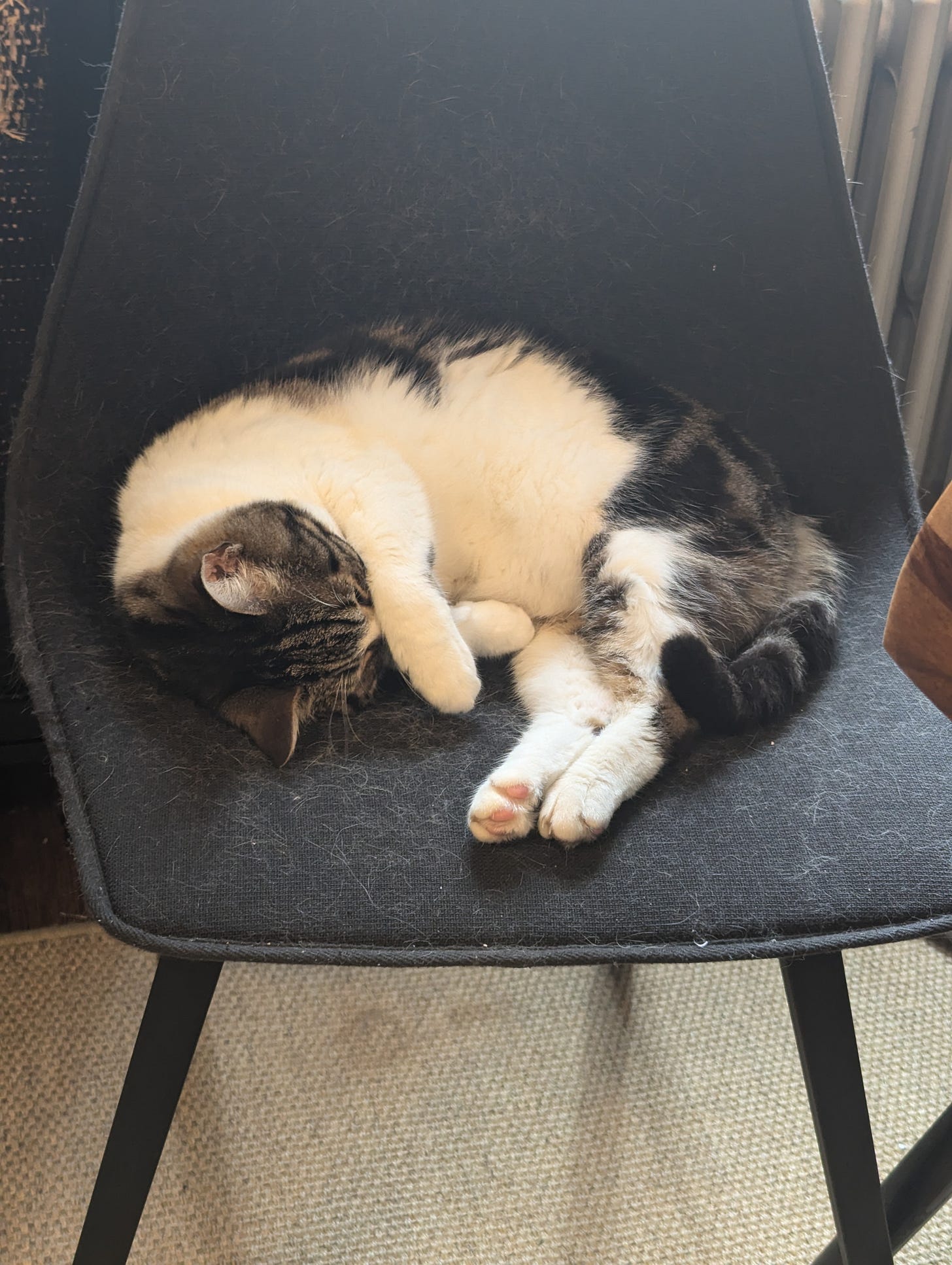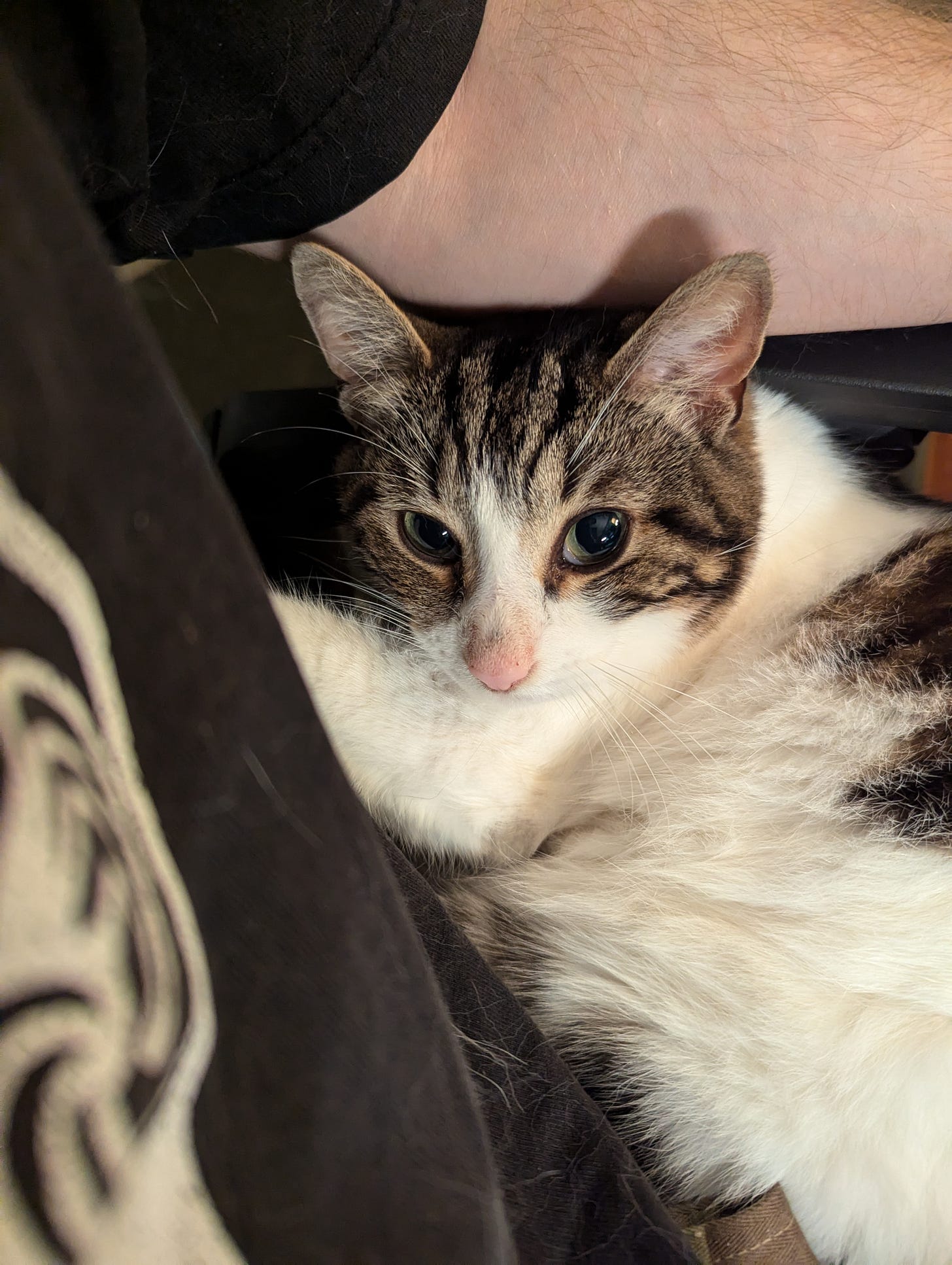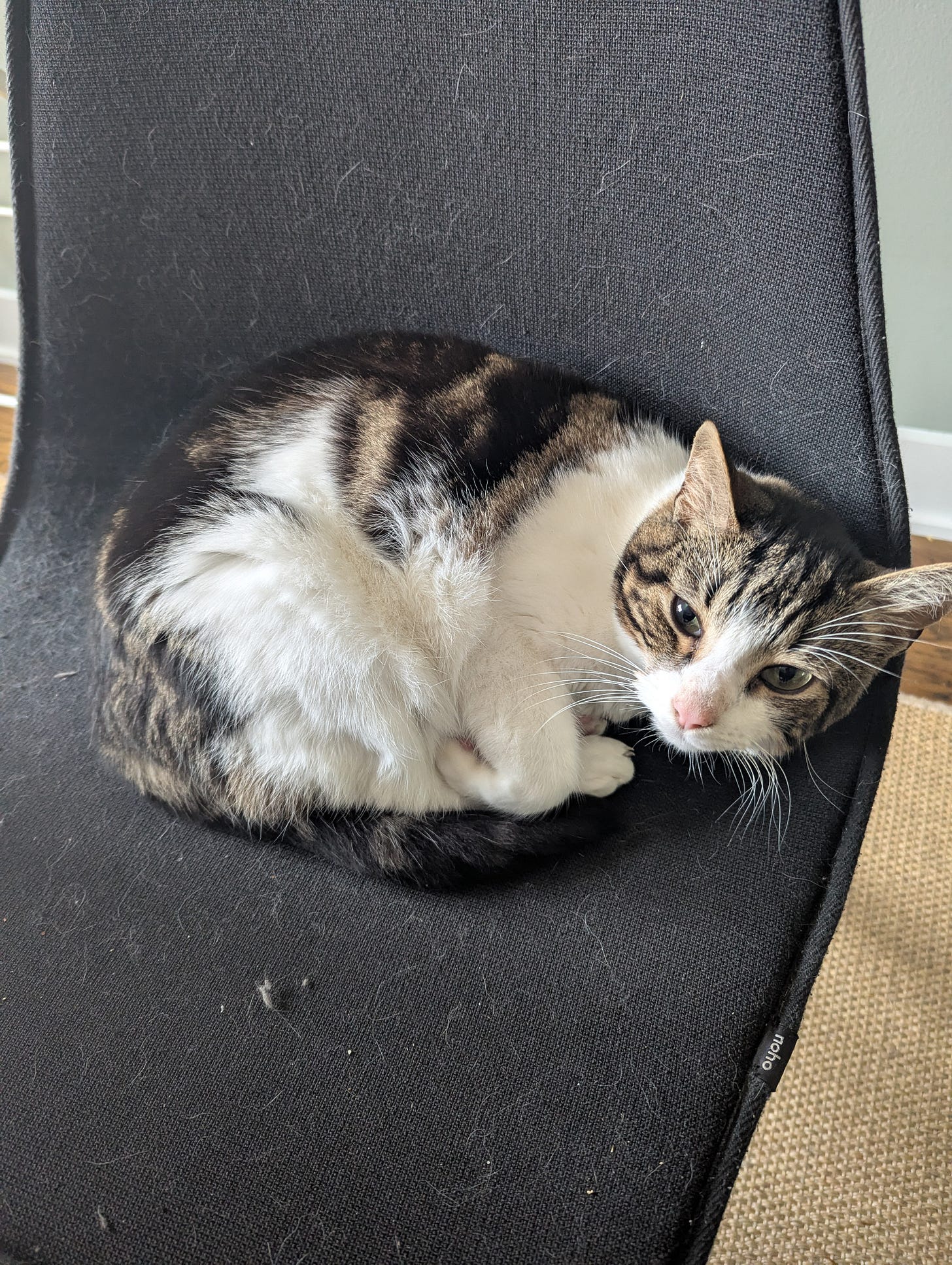
We left the bar at a quarter past midnight, the three of us walking side by side under the too-bright Ridgewood streetlamps. My legs were protesting loudly, feeling like lead after a long day of walking and biking, my head fuzzy from beer, but pleasantly resharpened by the cigarette we’d shared outside the bar.
I shouldered Joe, who was walking on my right, reaching my arm behind him to squeeze his opposite arm, saying “Love, you Joe.”
“Love you too man” he said, hugging me back.
I looked over to Maya on my left. “Love you too, Maya!” I shouted over.
“Love you too, Mo” she said after a slight pause.
“Awww,” I said, and hugged her in the same fashion.
We walked in silence for a few seconds before Maya said, “Not gonna lie, I felt a bit peer pressured into that.” We all laughed, but then her expression hardened, and she said earnestly, “But really, I do love you.”
Which was a relief.

I started telling my friends that I love them semi-regularly in 2019, before I left Seattle for New York. During my last few months there, regular meetups for coffee, drinks, or running became infused with a new and unwelcome gravity. I couldn’t help but obsess over the fact that the number of chances I had to see my friends was rapidly ticking down to zero. I could still come back to visit of course, but odds were good that it would never again be easy for us to see each other. It felt vitally important for me to verbalize how much they meant to me, and I made a point of telling each person directly, even somberly, that I loved them.
This habit proved hard to kick after I moved. My first apartment in NYC was a six-week sublet in the East Village with a woman named Lauren. I didn’t know a single thing about her before I moved in, but we hit it off extremely hard nonetheless. She was extremely vegan, obsessed with salsa dancing and home fermentation, and she loved to talk about philosophy and spirituality in a way that I obviously fucked with. During our short time living together, we spent countless hours yapping about our families and goals, our likes and dislikes. I felt outrageously lucky to have landed in an apartment with someone who I enjoyed spending time with so much.
Shortly after I moved into my next sublet, she invited me to her birthday party at her friend’s apartment in Brooklyn, where I got properly drunk for the first time in about half a year, trying to loosen myself up as I struggled to memorize a deluge of new names. We went out dancing afterwards, but I left after about an hour, not having much tolerance for clubbing. Before I left, I hugged Lauren goodbye, shouting over the music, “LOVE YOU!!” for no other reason than because it was true.
Even so, I spent the train ride home filled with dread and embarrassment. Surely this was far too early to tell a friend I loved them? Especially someone of the opposite sex! I’ve often worried that my expressions of platonic love might come off as romantic*, or just “too much”. Maybe it’s just my lack of imagination, but I still haven’t thought of any other words to convey the magnitude of my fondness for my friends.
*[The annoying/amusing result of this anxiety is that I have a much easier time telling men I love them than I do women, even though I’ve historically had more close female friends. I’ve never worried about my male friends thinking I might be coming onto them, because if we know each other well enough to be exchanging I love you’s then they’re sure to know that I am, for all intents and purposes, straight.]

Joe split off to walk east, while Maya and I walked south to Bushwick.
“I’m curious,” I asked after a block or two, “do you not tell your friends you love them often?” We had exchanged the words only once or twice before, while between Joe and I it was a pretty common occurrence.
“Maybe not as often as you? I think I take those words pretty seriously. I don’t know if you remember, I was in a sorority in college, and the girls were always screaming “ohmygod, I love you!” at each other all the time. I think that made me back off from it a bit.”
“Oof yeah, I can see how that could get annoying.”
“I mean, I did really like them. It just didn’t feel authentic for me to say it all the time.”
We had a meandering conversation about our relationship to the phrase. My parents are very generous with their “I love you’s”, and I wondered whether this had anything to do with their religious teacher, who began all his discourses with the ungrammatical incantation: “My love you my grandchildren.”
She asked, “And that didn’t ever feel fake to you? Like he was just saying it to manipulate people?”
“No, that honestly never occurred to me. He was a weird guy! Like even though I was pretty young when I stopped believing in the Islam stuff, I never doubted that this dude was a living embodiment of love. Not that I ever actually met him, he died before I was born. But I’m guessing that’s why people flocked to him in the first place—he somehow made universal unconditional love come off as genuine.”
We got back on the subject of saying “I love you” to our friends. What do we mean in our hearts when we say those words? We ultimately agreed that we don’t usually mean it as a positive statement, “I love x/y/z things about you,” but instead a negative one, “my life would not be the same without you.” It’s how we tell someone that they aren’t fungible, expressing a regard beyond admiration, and more like need.
[If you’re a longtime reader you’ve probably noticed that I’m experimenting more with dialogue lately. Writing dialogue is frustrating for me, because I can never remember the exact words that people said in a conversation, beyond one or two lines that stuck out to me. I’m now convinced that most authors of memoirs (except those with the most fantastically photographic memories) are just fabricating their dialogue whole-cloth, which is a real black pill for the entire concept of literary “nonfiction”.]

The problem is that the phrase “I love you” possesses far too much symbolic range in our culture, meaning radically different things depending on who you are and who you’re talking to. For example, I tell my parents and siblings I love them once or twice every time we talk. In these cases the words serve as a reaffirmation of our unconditional commitment to one another. They don’t feel half as weighty as when I say them to a friend—it’s more like a mantra, like saying “over and out” on a walkie talkie. Which isn’t to say that I don’t love them—quite the opposite, I am obsessed with my family—just that my familial “I love you’s,” come from a place of comfort and ease rather than vulnerability. In a way it’s more like how I tell my cat I love him (at least fifteen times a day). There are no stakes to my saying it, because there’s absolutely nothing he can do to make me stop loving him.
Romantic love is a completely different story. No matter what my gut-level feelings may be (butterflies, somersaults, etc.), I’m deeply circumspect about telling someone I’ve just started dating that I love them, because of the immense cultural significance associated with crossing that threshold. Choosing when to say “I love you” to a new partner almost feels more like a logistical calculation than an emotional confession. You’re not just saying that you love them, but also that you are committed to keep loving them, possibly indefinitely, with the end goal of building a life together. I find it quite frustrating that, by the time I’m ready to say “I love you” to someone I’m dating, we’ve invariably blown past the point of emotional closeness when I would’ve been comfortable saying it to them as a friend.
[I realize the paragraph above represents a monogamy-centric perspective, and I’d be curious to hear from any poly folks (past or present) about the role the words “I love you” play(ed) in your relationships, how you decided when to say them, what they meant, etc.]
In other languages and cultures, usage of “I love you” and its equivalents varies drastically. There’s a fun article by Alice Robb from 2019 on this topic, which shows the breadth of usage for various “I love you” analogs through interviews with translators and scholars. In some cultures the words are almost never used, even between spouses, much less parents and children (or friends). In other cases, a clear analogue doesn’t exist at all. For instance, according to one translator:
Japanese does not have a direct analogue to “I love you.” […] The phrase “ai shiteiru” means something close to “I love you,” but it doesn’t function as a relationship milestone in Japanese. Most people probably hear it more often in movies than in real life. Consider “I adore you” in English — a gorgeous sentiment, but who says that? Instead of saying “I love you,” a Japanese person would be more inclined to use any number of context-driven expressions of devotion and support, like “Work sounds tough” or “I can tell how hard you’re trying” or “I support you.”
Meanwhile an Arabic scholar says of Iraq:
“Like” and “love” are translated into the same word in Arabic. It’s not unusual, say, for a man to court a woman with “ahibbik” during a first encounter. Here in the United States, relationships evolve from liking to loving (culminating, potentially, in commitment), but in Iraq, the progress from courtship to commitment is marked with a family visit. The man’s family meets the woman’s family to ask for her hand in marriage. The visit is a declaration of commitment by the family and the suitor. In this sense, it might be equivalent to the commitment signaled by “I love you” in America.
A 2016 article by Uri Friedman covered the same topic, citing a group of Chinese researchers who tried to understand why it’s so much more common to say “I love you” in the United States than to use the Chinese equivalent, wo ai ni. Their goal was to help English teachers in China explain to students this bizarre and even uncomfortable aspect of American culture. They proposed that the usage of intense emotive language like “I love you” varies based on how “high-context” a culture is.
If the level of shared cultural context is high, much can be left implicit or unsaid. To generalize: A relatively young, individualistic, demographically diverse country like the United States is low-context; an older, collectivist, more demographically homogeneous country like China is high-context.
“Chinese values hold that direct and open verbal declaration”—like saying “I love you”—“is considered shallow and frivolous,” the researchers wrote. “Conversely, an indirect style of communication is considered civilized and sophisticated since actions speak louder than words.”
Friedman immediately undercuts this theory by bringing up Germany, which is also considered low-context, but in which the literal equivalent of “I love you”, Ich liebe dich, is far more rarely used.
[German is a tricky case where the literal translation may not be the functional analog, which is to say that other German phrases might map better onto the cultural meaning behind the English “I love you.” From the article:
“In English there is one all-purpose word for love, while in German there are different expressions—“I hold you dearly,” for instance—for different sorts of love (and the literal German equivalent of “I love you,” Ich liebe dich_, is perceived by many Germans as either excessively formal or indicative of a serious romantic commitment).”]_
Whether or not it explains the geographical variance between expressions of love, I find the idea of high-versus-low-context societies extremely compelling. It gives me language to describe something I didn’t know was bothering me, which is that pretty much my whole life has been spent in low-context environments—or rather, that I’ve always felt like I personally lacked context for any environments I’ve been in.
In the semi-insular Muslim sect I was raised in, all my friends were from different cultural backgrounds, as our families had all converted to Islam just one generation prior. At school, where my classmates were either evangelical Christians or atheists, the shared context was even lower. When I finally left the Northeast, landing in cities like Atlanta and Milwaukee, things got even more foreign. [And I was foreign to them, too. According to the friends I met in the midwest, Jews (and even pseudo-Jews like myself) are semi-mythical creatures once you leave the coasts.]
So it’s possible that my effusive use of emotional language is a way of coping with an overall sense of alienation from my surroundings, which makes me continuously anxious about being misunderstood, even by my closest friends. But even if I overcome this fear, I don’t plan on becoming any less vocal about my affections. I’d rather come off a loving idiot than risk my friends and family and loves ever doubting how much I care about them. And while time and energy are limiting factors, I earnestly believe the cliché that the more love you give, the more you’ll receive.
[A lot of cliché are like this. One of the most annoying things about growing up is being forced to learn through trial and error so many of the lessons that our forebears tried (unsuccessfully) to pass down through stories and proverbs. There’s something in our brains that makes received wisdom much less sticky than lived experience. This is why self-help books are largely useless—you really do just need to fuck around and find out.]